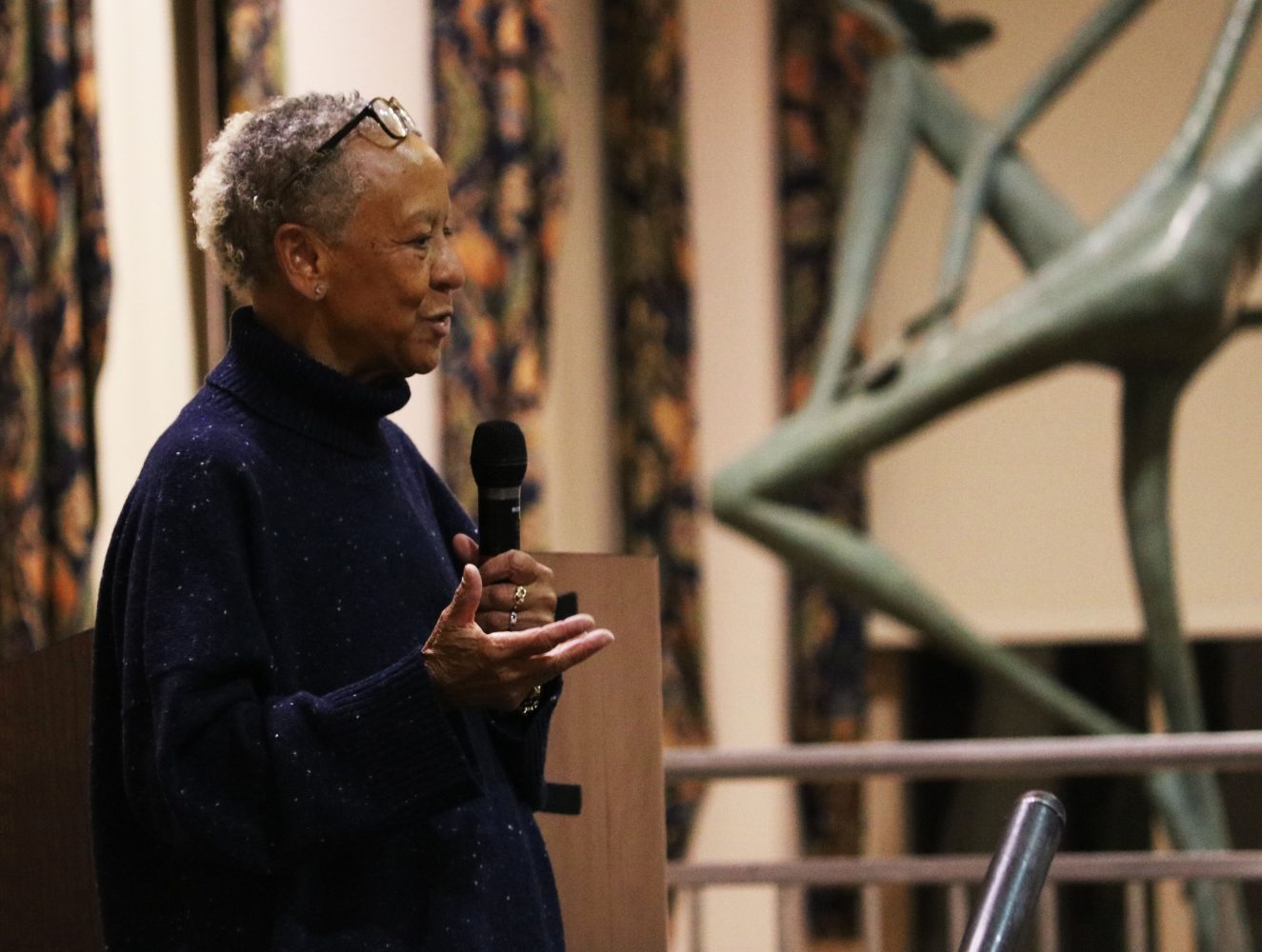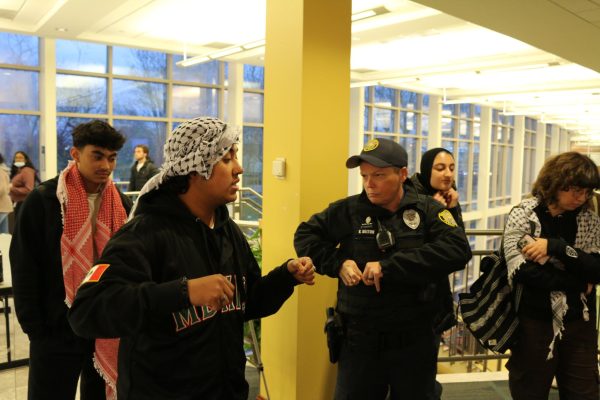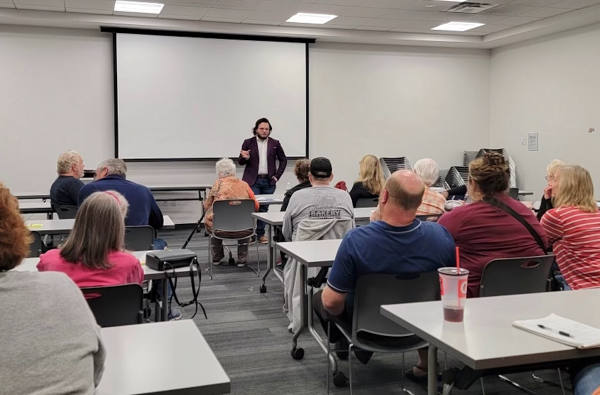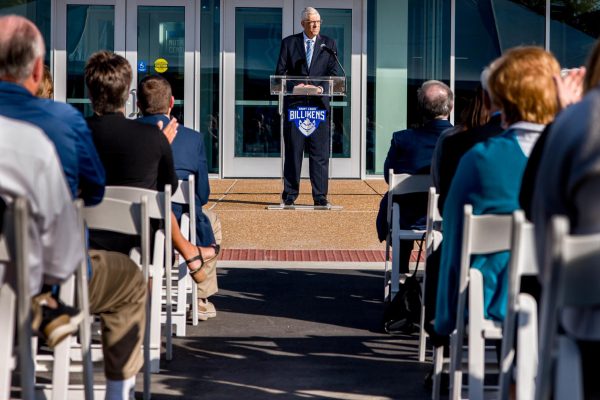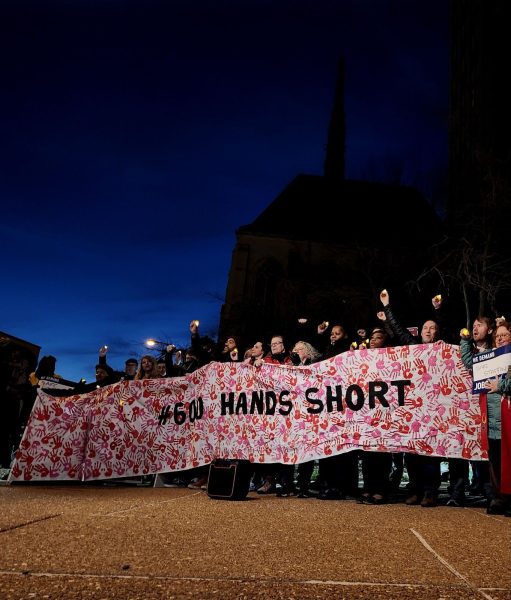Activist Nikki Giovanni shares experience
Poetry book in hand and a huge smile from ear-to-ear, civil rights activist, professor at Virginia Tech and famed poet Nikki Giovanni took to the platform in the Saint Louis Room on Feb. 2, surrounded by a racially diverse crowd of faculty and students as the keynote speaker for Black History Month.
The seven-time NAACP Awards winner and Grammy nominee — named one of Oprah Winfrey’s “25 Living Legends” and “Woman of the Year” in Ebony Magazine, Ladies Home Journal, and Mademoiselle Magazine, to name a few — presented a talk discussing recent developments in foreign policy and maintaining hope despite difficult times.
“You have to maintain hope because where are you going to be without hope,” Giovanni said. “You have a right to your own body […] and marriage is a sacred right. If you have a right to choose then you have a right to sit next to each other.”
In discussing her right to “choose” and prevalence of segregation in her life as a child growing up in Cincinnati and attending college at Fisk University in Nashville, Giovanni read from her poem entitled “Rosa,”, who she drew a comparison with her friend Rosa Parks: “childhood remembrances are always a drag/if you’re Black/you always remember things like living in Woodlawn/with no inside toilet/and if you become famous or something/they never talk about how happy you were to have/your mother/all to yourself and/how good the water felt when you got your bath.” For Giovanni, segregation was an inherent way of life.
Succeeding the poem reading, Giovanni acknowledged the anniversary of the Greensboro sit-ins as the day prior – with a slight chuckle, she explained that at that time “you did what you could when you could.” Once the Greensboro students sat in, the community organized the students of Fisk University to follow similarly, and, despite opposition from the police force, “God was good” as Giovanni explained that “Simple Simon’s” locked its doors, preventing police from forcing her out.
A good way to eliminate this forced removal even today, Giovanni mentioned, is to stand together and come through Trump. As an African American community, it came through slavery; it came through segregation; and it is going to come through Trump.
“It is going to be interesting to see how our music changes because every time we have had to deal with something not impossible but incredibly difficult, such as this election, new music comes about,” she added. “It could possibly arise a new form of art.”
In 2005, Giovanni mourned the passing of not only her mother, but also her sister Gary Ann, Aunt Ann, and friends Rosa Parks and Mrs. King. She elaborated her loss of support as unpredictable – without the strong support system she knew so well, Giovanni began to pour her emotions into her book “Acolytes,” published in 2007. “I sent my book to my editor Don Davis but didn’t want to discuss it; it was a bad time.”
As Giovanni recollected on this pivotal time in her career and its impact on her writing, she drew a comparison to one of her newer releases “Chasing Utopia,” published in 2013.
“Mommy drank a beer every single day when she was alive, so I was missing Mommy – why don’t I have a beer then? I looked up the number one beer, and it turns out it’s Utopias,” she explained. Amongst Giovanni’s storytelling of retrieving the Utopias from its maker while she was on NPR, she smiled and said, “Mama was more of a Bud Light person anyway.”
Giovanni frequently looked to God when she was struggling, but she believed in owning up to her own responsibilities and formulating her own aspirations.
“I grew up in a Baptist church,” Giovanni said. “You asked the Lord to help give you strength, but you were on your own [to solve your own problems]. All you can do is go forward.”
Your donation will support the student journalists of Saint Louis University. Your contribution will help us cover our annual website hosting costs.
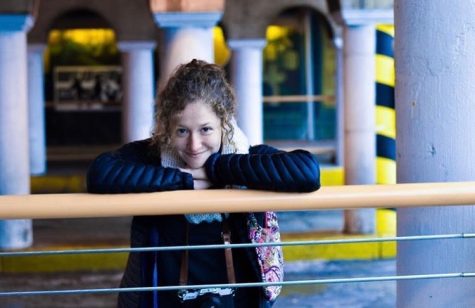
Staunch entered SLU as a Biomedical Engineering major on a Pre-med track, with the intention of continuing her studies in medical school. After a year and a half at SLU, she realized she missed the balance of the arts with sciences as she was previously an editor in her high school yearbook committee.
"Working for UNews, whether it was as Associate News Editor, Managing Editor, or Editor-in-Chief, has taught me the value of working on tight deadlines and how to adequately adapt to certain unexpected situations. The field of Journalism is incredibly fast paced - but that is why I love it so much," Staunch said. "There is always something new occurring, and you would not be able to effectively complete your job unless you had the support of your other editors and staff."
Though paradoxical in nature, she switched her major to Communication. She wants to incorporate both her analytical and creative sides to report on medical topics. Her dream job: to write for Discover Magazine.
When Staunch is not in the newsroom, she is captaining the women’s Ultimate Frisbee team at SLU. She began playing her freshman year and enjoys it as an outlet.


